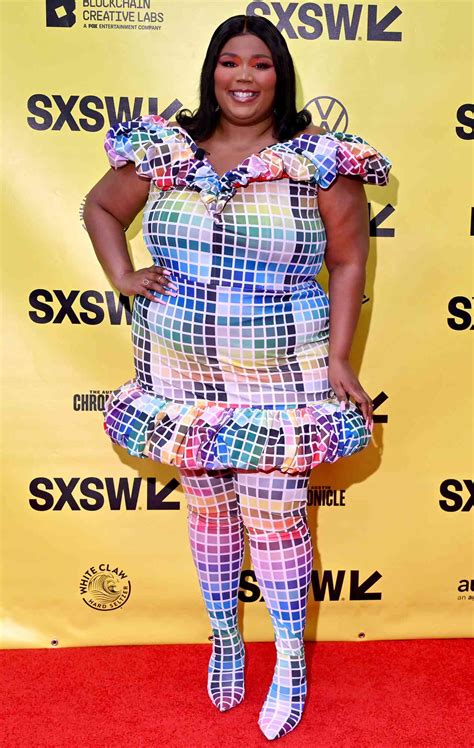
Lizzo is embracing a body-confident summer, showcasing a new look while continuing to advocate for body positivity, despite facing persistent scrutiny regarding her weight and health.
Lizzo, the Grammy-winning artist known for her music and advocacy for body positivity, is navigating another summer in the spotlight, this time showcasing a new physical appearance. While she remains committed to promoting self-acceptance and body confidence, her journey continues to be marked by both admiration and criticism, particularly concerning her weight and health choices. This latest chapter underscores the ongoing complexities of body image discussions in the public sphere.
The singer has been documenting her summer experiences on social media, offering fans glimpses into her life, travels, and evolving style. These posts have sparked renewed conversations about her body, with some applauding her confidence and others expressing concern over her health. The discourse surrounding Lizzo’s body is not new, but it highlights a broader societal struggle with accepting diverse body types and understanding the nuances of health.
“I’m not trying to be skinny. I’m just trying to live a long time,” Lizzo stated in a previous interview, addressing the constant commentary on her weight. This declaration encapsulates her personal philosophy: prioritizing longevity and well-being over conforming to conventional beauty standards. Her message resonates with many who feel pressured to adhere to unrealistic ideals, while simultaneously drawing criticism from those who equate weight with health.
Lizzo’s public persona has consistently challenged traditional norms, particularly within the music industry. She entered a space often dominated by homogenous body types and used her platform to celebrate inclusivity. Her music often promotes self-love, and her performances radiate confidence, encouraging fans to embrace their own bodies regardless of size. This has earned her a dedicated following and positioned her as a prominent voice in the body positivity movement.
However, this role has also made her a target for criticism. Some argue that promoting body positivity, especially in larger bodies, normalizes unhealthy lifestyles. This perspective often fails to acknowledge the complexities of health, which encompasses mental, emotional, and physical well-being, and is not solely determined by weight. Lizzo has repeatedly emphasized that her focus is on health, not weight loss, and that her choices are personal.
The scrutiny Lizzo faces often stems from deeply ingrained societal biases about weight. Studies have shown that larger individuals are often subject to prejudice and discrimination, facing negative stereotypes about their health, intelligence, and work ethic. This bias can manifest in various forms, from casual comments to systemic barriers in healthcare and employment.
Lizzo’s willingness to address these biases publicly has contributed to a broader dialogue about weight stigma. By sharing her experiences, she helps to expose the harmful effects of weight-based discrimination and encourages more compassionate and nuanced conversations about body image. Her actions have prompted many to question their own assumptions about weight and health, leading to greater awareness and understanding.
In recent appearances, Lizzo’s changed appearance has been noticeable. While she has not explicitly stated that she is actively trying to lose weight, the changes have fueled speculation. Some have praised her for seemingly prioritizing her health, while others have expressed concern that she is succumbing to societal pressure. These reactions underscore the delicate balance Lizzo navigates as a public figure whose body is constantly under observation.
It’s crucial to recognize that Lizzo’s health journey is her own and that judging her choices based on appearance alone is inherently problematic. True support for body positivity means respecting individuals’ autonomy to make decisions about their own bodies without facing judgment or criticism. This includes acknowledging that health is a personal matter and that there is no one-size-fits-all approach.
The ongoing discussion surrounding Lizzo’s body serves as a reminder of the work that remains to be done in promoting true body acceptance. While progress has been made in challenging traditional beauty standards, societal biases persist. By continuing to advocate for inclusivity and self-love, Lizzo plays a significant role in shaping a more compassionate and accepting world.
Moreover, it is essential to contextualize the pervasive pressure to conform to specific beauty ideals within the broader media landscape. Advertising, social media, and entertainment often perpetuate narrow representations of beauty, contributing to feelings of inadequacy and self-doubt. This pressure is particularly acute for women, who are often subjected to unrealistic standards of appearance.
Lizzo’s advocacy for body positivity is not simply about promoting acceptance of larger bodies; it’s about challenging the entire system that perpetuates harmful beauty ideals. She encourages people to focus on their inner worth, celebrate their unique qualities, and reject the notion that their value is determined by their physical appearance. This message is particularly important for young people, who are often bombarded with images of seemingly perfect bodies and may struggle with self-esteem as a result.
The conversation surrounding Lizzo’s body also highlights the complexities of navigating health concerns in the public eye. While it’s understandable that some people may express concern for her well-being, it’s important to avoid making assumptions about her health based solely on her appearance. Health is a multifaceted issue that encompasses a wide range of factors, including genetics, lifestyle, and mental health.
Furthermore, it’s crucial to recognize that larger individuals can be healthy and that weight is not always an accurate indicator of health. Many people who are considered overweight or obese are perfectly healthy, while others who are considered thin may have underlying health problems. Focusing solely on weight can be a harmful and misleading way to assess someone’s overall well-being.
Lizzo has consistently emphasized that her focus is on health, not weight loss, and that she is making choices that are right for her. She has also spoken openly about her struggles with mental health, highlighting the importance of self-care and seeking support when needed. By sharing her experiences, she helps to destigmatize mental health issues and encourages others to prioritize their well-being.
In conclusion, Lizzo’s body-confident summer serves as a reminder of the ongoing complexities of body image discussions. While she continues to advocate for self-acceptance and inclusivity, she also faces persistent scrutiny regarding her weight and health. By understanding the nuances of these conversations and challenging societal biases, we can create a more compassionate and accepting world for everyone. Her journey encourages a reevaluation of personal biases related to beauty standards, advocating for a focus on overall well-being beyond mere physical appearance.
Frequently Asked Questions (FAQs)
-
What is Lizzo primarily known for?
- Lizzo is primarily known for her music, which often blends elements of hip-hop, R&B, and soul, as well as her advocacy for body positivity and self-love. She promotes messages of inclusivity and encourages fans to embrace their bodies regardless of size, as noted from the original source.
-
Why is Lizzo’s body constantly a topic of discussion?
- Lizzo’s body is frequently discussed because she challenges traditional beauty standards in an industry and society that often promote narrow representations of beauty. As a result, her body becomes a focal point for conversations about body image, health, and societal biases regarding weight, according to the original article.
-
What has Lizzo said about her health and weight?
- Lizzo has stated, “I’m not trying to be skinny. I’m just trying to live a long time,” emphasizing that her focus is on longevity and well-being rather than conforming to conventional beauty standards. She prioritizes her health choices as personal and separate from societal expectations of weight.
-
What are some of the criticisms Lizzo faces regarding her advocacy for body positivity?
- Some critics argue that promoting body positivity, particularly in larger bodies, normalizes unhealthy lifestyles. They often equate weight with health and suggest that larger individuals are promoting unhealthy behaviors. This criticism, however, fails to acknowledge the complexities of health, which encompasses mental, emotional, and physical well-being, and is not solely determined by weight.
-
How does Lizzo’s situation reflect broader societal issues?
- Lizzo’s situation reflects deeply ingrained societal biases about weight and the pervasive pressure to conform to specific beauty ideals. It highlights the challenges larger individuals face in a world that often subjects them to prejudice and discrimination based on their appearance.
-
Has Lizzo addressed changes in her appearance recently?
- While Lizzo’s changed appearance has been noticeable, she has not explicitly stated that she is actively trying to lose weight. The changes have fueled speculation, with reactions ranging from praise for prioritizing her health to concern that she is succumbing to societal pressure.
-
What is the main message behind Lizzo’s advocacy for body positivity?
- Lizzo’s advocacy for body positivity is about challenging the entire system that perpetuates harmful beauty ideals. She encourages people to focus on their inner worth, celebrate their unique qualities, and reject the notion that their value is determined by their physical appearance.
-
Why is it important to avoid making assumptions about someone’s health based on their appearance?
- It is crucial to avoid making assumptions about someone’s health based on appearance because health is a multifaceted issue that encompasses a wide range of factors, including genetics, lifestyle, and mental health. Weight is not always an accurate indicator of health, and focusing solely on weight can be harmful and misleading.
-
What role does Lizzo play in shaping a more compassionate and accepting world?
- By continuing to advocate for inclusivity and self-love, Lizzo plays a significant role in shaping a more compassionate and accepting world. Her journey encourages a reevaluation of personal biases related to beauty standards, advocating for a focus on overall well-being beyond mere physical appearance.
-
How does media influence beauty standards and body image?
- Advertising, social media, and entertainment often perpetuate narrow representations of beauty, contributing to feelings of inadequacy and self-doubt. This pressure is particularly acute for women, who are often subjected to unrealistic standards of appearance.
-
What is weight stigma, and how does it affect individuals?
- Weight stigma refers to the prejudice and discrimination directed toward individuals based on their weight. It can manifest in various forms, from casual comments to systemic barriers in healthcare and employment, leading to negative stereotypes about their health, intelligence, and work ethic.
-
How can individuals contribute to promoting true body acceptance?
- True support for body positivity means respecting individuals’ autonomy to make decisions about their own bodies without facing judgment or criticism. This includes acknowledging that health is a personal matter and that there is no one-size-fits-all approach.
-
What is the relationship between mental health and body image?
- Mental health and body image are closely linked. Negative body image can contribute to mental health issues such as anxiety, depression, and eating disorders. Conversely, mental health challenges can impact how individuals perceive their bodies. Lizzo has spoken openly about her struggles with mental health, highlighting the importance of self-care.
-
How does Lizzo challenge traditional norms within the music industry?
- Lizzo entered a space often dominated by homogenous body types and used her platform to celebrate inclusivity. Her music often promotes self-love, and her performances radiate confidence, encouraging fans to embrace their own bodies regardless of size.
-
Why is it essential to destigmatize mental health issues?
- Destigmatizing mental health issues is crucial because it encourages individuals to seek help and support when needed. By sharing her experiences, Lizzo helps to normalize conversations about mental health and reduces the shame and stigma associated with it.
-
What does prioritizing health mean beyond just physical appearance?
- Prioritizing health beyond physical appearance means focusing on mental, emotional, and physical well-being. It involves making choices that support overall wellness, such as practicing self-care, managing stress, and seeking support when needed.
-
How can we address and change ingrained societal biases about weight?
- Addressing and changing ingrained societal biases about weight requires education, awareness, and challenging negative stereotypes. It involves promoting more compassionate and nuanced conversations about body image and recognizing that health is a personal matter.
-
What is the role of media literacy in promoting positive body image?
- Media literacy plays a crucial role in promoting positive body image by helping individuals critically analyze and deconstruct media messages. It encourages people to recognize the unrealistic standards often portrayed in media and to develop a more balanced perspective on beauty and body image.
-
How can parents and educators promote positive body image in children and adolescents?
- Parents and educators can promote positive body image by fostering a supportive and accepting environment, encouraging self-acceptance, and challenging negative stereotypes about weight and appearance. They can also emphasize the importance of health and well-being over physical appearance.
-
Why is it important to have diverse representation in media?
- Diverse representation in media is essential because it helps to challenge narrow beauty standards and promotes inclusivity. It allows individuals to see themselves represented in a variety of roles and contexts, fostering a greater sense of belonging and self-acceptance.
-
How does the focus on weight loss impact mental health?
- The focus on weight loss can negatively impact mental health by contributing to feelings of inadequacy, anxiety, and depression. It can also lead to disordered eating patterns and a preoccupation with body weight and shape.
-
What are some healthy ways to approach discussions about health and well-being?
- Healthy ways to approach discussions about health and well-being include focusing on overall wellness, emphasizing the importance of self-care, and avoiding judgmental or shaming language. It also involves recognizing that health is a personal matter and that there is no one-size-fits-all approach.
-
How can social media be used to promote positive body image?
- Social media can be used to promote positive body image by sharing messages of self-love, celebrating diverse body types, and challenging unrealistic beauty standards. It can also be used to create communities of support and encouragement.
-
What are some resources available for individuals struggling with body image issues?
- Resources available for individuals struggling with body image issues include mental health professionals, support groups, and online resources such as the National Eating Disorders Association (NEDA) and the Body Positive organization.
-
How does Lizzo’s advocacy empower others to embrace their bodies?
- Lizzo’s advocacy empowers others to embrace their bodies by challenging societal norms, promoting self-love, and encouraging people to celebrate their unique qualities. Her confidence and authenticity inspire others to reject negative stereotypes and to accept themselves as they are.









